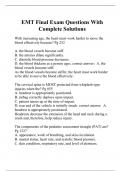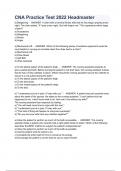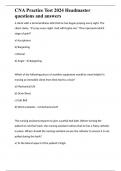WEEK ONE:
history of psychology
Psychology: scientific study of the mind, mental processes and human
behaviour.
psychology deconstructs the individual’s thoughts and behaviors to find
out more about them.
2 ways to engage in psychology:
1. What psychology is saying.
o Concepts, theories, ideas, models
o Standing in psychology as a student
2. How psychology is saying this.
o Context in which these concepts arise in the first place
o Standing outside psychology and seeing what it’s doing
why do we need to know about the history of psychology?
o helps us to determine how knowledge is used in the present.
o Makes us aware of how the past shapes and influences how we think
in the future.
KNOWLEDGE PRODUCTION: production of knowledge about
psychology in SA, which informs how we practice psychology through
teaching, research, psychotherapy, psychometric assessment, etc.
The history of knowledge that psychology has produced at an
international and local level is:
o Steeped in Western/ Eurocentric values.1
o Promotes a positivist-empirical mode of scientific investigation. 2
Problems with this view of knowledge?
o fails to take peoples social, historical, and political location into
context.
WESTERNIZED/POSITIVIST PSYCHOLOGICAL KNOWLEDGE IN A SOUTH
AFRICAN CONTEXT
2 histories to consider:
o History of psychology in general
o History of South Africa (how psych unfolded within this context)
2 key historical factors shaped south Africa:
o Racism
1
reflects interests and ideas of typically white, heterosexual, middle class,
educated American & European societies.
2
knowledge is only considered scientific, valid, true and factual when it is
produced under conditions that are observable, highly controlled & quantified .
, o Apartheid
History of psychology is divided into 2 periods which represent
noticeable shifts in the political landscape of South Africa:
Pre-1994:
o Apartheid state.
o Psychology took up a humanitarian role.3
o Authorised racism by denying and ignoring the system (it reasoned
and produced arguments which justified racist practises).
o Documented white peoples lived experiences & ignored black
people.
o Generated a racially skewed process of knowledge production &
training (there was an under-representation of black psychologists).
o Racially defined set of diagnostics systems (while white people
would be diagnosed with depression, black people would be
diagnosed with bantu-hysteria for same symptoms).
o Subtly objectified black people as the negative ‘other’.
o Devoted all its attention to problems of the poor white people (led to
the high number of black people living in poverty today – systemic
racism).
Why did South African psychology not resist the apartheid regime?
o South African psychologists were indoctrinated into systems of
knowledge and ideologies that left them little room to criticize and
challenge racism.
o Western/Eurocentric positivist system.
o Apartheid regimes racist way of life.
o Majority of psychologists were white, middle class & benefitted from
apartheids racism.
o Black psychologists didn’t represent a large enough number to
create a strong resistance (<10%).
o Eugenics4 movement was supported by psychologists during
apartheid (for example, it promoted that black people should be
sterilized to stop reproduction of an “inferior and unfit” species).
o Access to the best universities in terms of resources and funding
was reserved for whites (Extension of the University Education Act
No. 45 of 1959).
o The psychology curriculum was complicit in reproducing racism
(psychological institute of RSA had a say in curriculums content).
o More than 18 000 books encouraging critical thinking were banned
from universities. (Publications Act No. 42 of 1974).
3
seeking to promote human welfare
4
The idea that black people are genetically inferior to white people
, Post-1994
o End of apartheid and institutionalized racism led to a period of hope
and change
o Psychologists side-stepped the subject of racism (although free to
engage in this subject, there were still substantial barriers to the
knowledge it was producing).
o Attempts to reform psychology at a professional and institutional
level (redress effects of apartheid).
o Removing organized psychology from ties with apartheid racism
(PSYSSA)5.
o Creation of new organizations.
o Academic reform through research and publishing (shifting
knowledge production to represent silenced voices).
Although attempts were made to implement changes, new forms of
marginalization emerged:
o Minority of black academics in psychology - low rates of publishing.
o Black academics still at disadvantaged universities – research and
publication not given priority.
o Black academics burdened with teaching larger volumes of students
– no time to publish.
o English was still the primary medium of publication.
o Western/Eurocentric knowledge was continued being used.
Substantial barriers remain in removing racist ideologies, which effect the
practice of psychology.
Readings:
o Naidoo, A.V. (1996). Challenging the hegemony of Eurocentric
psychology. Journal of Community and Health Sciences, 2(2), 9-
16
o Duncan, N., Stevens, G., & Bowman, B. (2004). South African
psychology and racism: historical determinants and future
prospects. In Hook, D (eds), Critical psychology (pp 360-389).
Cape Town: Juta & Company Ltd.
o Adams, G., Dobles, I., Gómez, L. H., Kurtiş, T., & Molina, L. E.
(2015). Decolonizing psychological science: Introduction to the
special thematic section. Journal of Social and Political
Psychology, 3(1), 213-238.
Key questions:
o How did psychology fit into apartheid?
5
Had a vision to make psychology more socially relevant
, o Was it complicit in promoting apartheid and racism or did it
challenge this system and its racist ideologies?
history of psychology
Psychology: scientific study of the mind, mental processes and human
behaviour.
psychology deconstructs the individual’s thoughts and behaviors to find
out more about them.
2 ways to engage in psychology:
1. What psychology is saying.
o Concepts, theories, ideas, models
o Standing in psychology as a student
2. How psychology is saying this.
o Context in which these concepts arise in the first place
o Standing outside psychology and seeing what it’s doing
why do we need to know about the history of psychology?
o helps us to determine how knowledge is used in the present.
o Makes us aware of how the past shapes and influences how we think
in the future.
KNOWLEDGE PRODUCTION: production of knowledge about
psychology in SA, which informs how we practice psychology through
teaching, research, psychotherapy, psychometric assessment, etc.
The history of knowledge that psychology has produced at an
international and local level is:
o Steeped in Western/ Eurocentric values.1
o Promotes a positivist-empirical mode of scientific investigation. 2
Problems with this view of knowledge?
o fails to take peoples social, historical, and political location into
context.
WESTERNIZED/POSITIVIST PSYCHOLOGICAL KNOWLEDGE IN A SOUTH
AFRICAN CONTEXT
2 histories to consider:
o History of psychology in general
o History of South Africa (how psych unfolded within this context)
2 key historical factors shaped south Africa:
o Racism
1
reflects interests and ideas of typically white, heterosexual, middle class,
educated American & European societies.
2
knowledge is only considered scientific, valid, true and factual when it is
produced under conditions that are observable, highly controlled & quantified .
, o Apartheid
History of psychology is divided into 2 periods which represent
noticeable shifts in the political landscape of South Africa:
Pre-1994:
o Apartheid state.
o Psychology took up a humanitarian role.3
o Authorised racism by denying and ignoring the system (it reasoned
and produced arguments which justified racist practises).
o Documented white peoples lived experiences & ignored black
people.
o Generated a racially skewed process of knowledge production &
training (there was an under-representation of black psychologists).
o Racially defined set of diagnostics systems (while white people
would be diagnosed with depression, black people would be
diagnosed with bantu-hysteria for same symptoms).
o Subtly objectified black people as the negative ‘other’.
o Devoted all its attention to problems of the poor white people (led to
the high number of black people living in poverty today – systemic
racism).
Why did South African psychology not resist the apartheid regime?
o South African psychologists were indoctrinated into systems of
knowledge and ideologies that left them little room to criticize and
challenge racism.
o Western/Eurocentric positivist system.
o Apartheid regimes racist way of life.
o Majority of psychologists were white, middle class & benefitted from
apartheids racism.
o Black psychologists didn’t represent a large enough number to
create a strong resistance (<10%).
o Eugenics4 movement was supported by psychologists during
apartheid (for example, it promoted that black people should be
sterilized to stop reproduction of an “inferior and unfit” species).
o Access to the best universities in terms of resources and funding
was reserved for whites (Extension of the University Education Act
No. 45 of 1959).
o The psychology curriculum was complicit in reproducing racism
(psychological institute of RSA had a say in curriculums content).
o More than 18 000 books encouraging critical thinking were banned
from universities. (Publications Act No. 42 of 1974).
3
seeking to promote human welfare
4
The idea that black people are genetically inferior to white people
, Post-1994
o End of apartheid and institutionalized racism led to a period of hope
and change
o Psychologists side-stepped the subject of racism (although free to
engage in this subject, there were still substantial barriers to the
knowledge it was producing).
o Attempts to reform psychology at a professional and institutional
level (redress effects of apartheid).
o Removing organized psychology from ties with apartheid racism
(PSYSSA)5.
o Creation of new organizations.
o Academic reform through research and publishing (shifting
knowledge production to represent silenced voices).
Although attempts were made to implement changes, new forms of
marginalization emerged:
o Minority of black academics in psychology - low rates of publishing.
o Black academics still at disadvantaged universities – research and
publication not given priority.
o Black academics burdened with teaching larger volumes of students
– no time to publish.
o English was still the primary medium of publication.
o Western/Eurocentric knowledge was continued being used.
Substantial barriers remain in removing racist ideologies, which effect the
practice of psychology.
Readings:
o Naidoo, A.V. (1996). Challenging the hegemony of Eurocentric
psychology. Journal of Community and Health Sciences, 2(2), 9-
16
o Duncan, N., Stevens, G., & Bowman, B. (2004). South African
psychology and racism: historical determinants and future
prospects. In Hook, D (eds), Critical psychology (pp 360-389).
Cape Town: Juta & Company Ltd.
o Adams, G., Dobles, I., Gómez, L. H., Kurtiş, T., & Molina, L. E.
(2015). Decolonizing psychological science: Introduction to the
special thematic section. Journal of Social and Political
Psychology, 3(1), 213-238.
Key questions:
o How did psychology fit into apartheid?
5
Had a vision to make psychology more socially relevant
, o Was it complicit in promoting apartheid and racism or did it
challenge this system and its racist ideologies?





